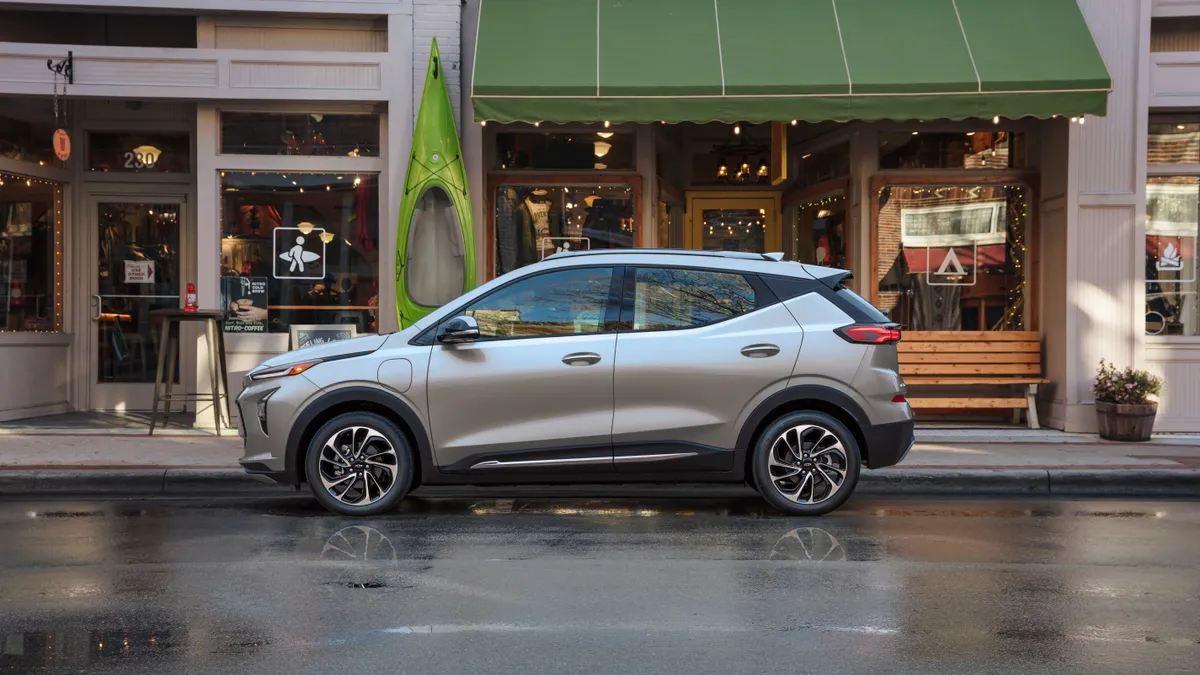Dive Brief:
- The U.S. Department of Energy announced Monday it plans to loan $2.5 billion to Ultium Cells, a joint venture of General Motors and South Korea-based battery manufacturer LG Energy Solution, in order to develop new lithium-ion cell manufacturing facilities in Ohio, Tennessee, and Michigan.
- Ultium will provide battery cell capacity to support GM's North American electric vehicle business, which plans to manufacture 1 million EVs annually by 2025.
- Automakers are increasingly looking to manufacture their own battery cells in order to support growing EV production. Toyota and Ford are also building battery plants, Volkswagen is eyeing U.S. production and Tesla has Gigafactories in Nevada and New York.
Dive Insight:
With the auto industry rapidly shifting to produce millions of electric cars and trucks, manufacturers are reckoning with supply chain constraints and developing new business models to alleviate bottlenecks.
The development of battery manufacturing capacity is a strategic move, according to Kwasi Ampofo, BloombergNEF head of metals and mining.
Automakers realize that battery companies do not have sufficient capacity to meet their demand, Ampofo said, “so they have to forego the historical model ... where they rely on third parties for almost every part, just in time when they need it.”
“It's a very, very big diversion for auto companies,” Ampofo said. And the shift comes as battery prices are rising for the first time in more than a decade, driven by supply chain issues and the rising cost of metals, he said.
DOE’s Loan Program Office plans to offer Ultium the loan through its Advanced Technology Vehicles Manufacturing program, which supports manufacturing of light-duty vehicles and components. The agency said it would be the first loan through that program exclusively for battery cell manufacturing, though it has previously extended loans to Tesla, Nissan and Ford for a variety of purposes.
EVs accounted for almost 5% of new U.S. car sales in the first quarter of this year, according to automotive industry reports. BNEF expects EV sales to grow from 6.6 million last year to 20.6 million in 2025, DOE noted in its announcement. And growing adoption means the demand for EV batteries will exceed 580 GWh by 2030, the agency said.
Battery cells manufactured by Ultium would use a “state-of-the-art nickel-cobalt-manganese-aluminum chemistry to deliver more range at less cost,” DOE said. “The cells can be arranged in different combinations of flexible modules and battery packs to provide the energy for every segment on the road today, from performance vehicles to work trucks.”
Ultium said its battery manufacturing facilities will create more than 5,000 jobs in the United States. “We are grateful for the consideration and look forward to working with the Department of Energy on next steps,” the company said in a statement.
Separately, GM announced Tuesday it has reached an agreement with LG Chem to provide raw materials to Ultium for battery production, beginning the second half of this year and running through 2030. The agreement provides sufficient material for roughly 5 million EVs, the auto manufacturer said.
“GM now has contractual commitments secured with strategic partners for all battery raw material to support our goal of 1 million units of EV capacity by the end of 2025,” Jeffrey Morrison, GM vice president of global purchasing and supply chain, said in a statement.
GM aims to generate $90 billion in annual EV revenue by 2030.















